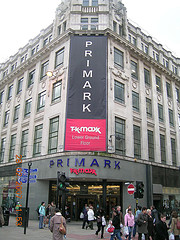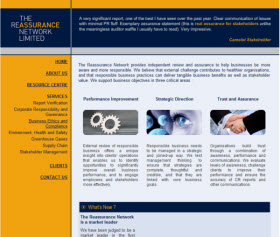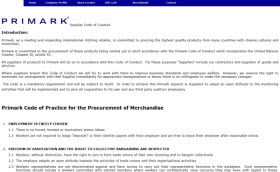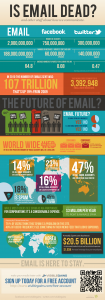

 Think of great classic combinations: Fred and Ginger; Sonny and Cher; Laurel and Hardy. “The BBC and Primark” could soon be added to this list.
Think of great classic combinations: Fred and Ginger; Sonny and Cher; Laurel and Hardy. “The BBC and Primark” could soon be added to this list.
Last summer the BBC exposed how some of Primark’s fashion clothing range came from Far East sweatshops.
Now the BBC has done it again, this time showing that Primark’s continues to engage suppliers who use unsustainable employment practices.
Reaction to the news will been varied. Fashionistas may shake their heads sadly and say that the cheap, ethical fashion Primark which claims to sell simply cannot exist.
On the other hand, political deep-reds may get all agitated, saying corporations simply cannot be trusted. Both are, to some extent, correct.
Sustainable Company Flouts Minimum Wage
It’s accepted that the price of cheap goods in the West is often subsidised by exploitative and unsustainable employment practices. Improving those practices will undoubtedly lead to rising prices.
That these Primark sweatshops were in the UK not the Far East which is a great worry and the BBC investigation exposed that the supplier (TNS Knitware) was paying only two-thirds of the National Minimum Wage (£5.73 / $8 per hour).
The revelation is doubly embarrassing as 2008 saw Primark overtake George At Asda as the UK’s leading value fashion retailer. They will not like the insinuation that this success is based upon double standards.
Leading Companies Can’t Get Sustainability Assurance Right
One important fact is that Primark is not a small niche company but part of Associated British Food (ABF), a FTSE100 company. Other brands owned by the company include Ryvita, Ovaltine and Twinings, all of which are deeply embedded in the British psyche.
What’s more, Primark didn’t really do anything wrong. They used an external ethical standard (the Ethical Trading Initiative) to ensure their principles remained unsullied by commercial interests.
They also used the independent auditors The Reassurance Network who have been acknowledged as a market leader in the Corporate Responsibility Assurance, according to the first survey of its kind undertaken by Verdantix.
Is Independent Sustainability Assurance The Solution?
Bizarrely, this may be precisely where the problem lies.
Independent auditing is widely recognised as a keystone in providing good quality assurance. However Corporate Responsibility Assurance is a very new field and like all the companies involved in the sector are still finding their way in it.
For instance, and with the benefit of 20/20 hindsight, a few facts spring out from Primark’s December 2008 audit of TNS Knitwear:
- the company has only just started keeping personnel files, required to store details such as contractual agreements and disciplinary records
- the company was not keeping the correct documentation to show that an individual was permitted to work in the UK
- documentary proof of the hours staff worked was not available to the auditors and the company does not keep track of holiday entitlements
- staff could not remember there having been a fire drill despite management saying there had been one.
Many of these indicate a failure to adhere to long standing UK regulations. In some cases TNS Knitwear pleaded that they weren’t aware of those regulations, a strange defence for a company which has been operating since 1989.
To re-emphasise, I’m writing this with the benefit of 20/20 hindsight. However, from my previous experience as an IT auditor, I would have expected this kind of behaviour to make an auditor suspicious and seek to dig deeper.
It’s unclear whether this happened in this case or whether it would have led the auditor to uncover the illegal wage levels exposed by the BBC investigation.
Strengthening Independent Sustainability Assurance
How can the industry learn from such an apparent failing by a leading UK independent auditor working for one of the largest companies in the country?
Are there patterns in behaviour which ought to be watched out for? Or perhaps a set of best practice guidelines which can be applied to all standards and schemes?
Maybe an independent certification scheme is required, which will ensure all corporate responsibility auditors have reached an appropriate level of competence?
Please share your thoughts and tell us how you believe assurance can be improved and how those improvements can be best communicated on corporate websites.
We shall also be running a series of articles looking at the issues thrown up by this latest entanglement of Primark, trying to chart a way to practical solutions and their online application.
Picture Credit: Primark by Gene Hunt from Flickr under Creative Commons Attribution License.
Lucy is Editor at Corporate Eye





Interesting. There is a lot of rhetoric going around as companies attempt to capitalize on the “green” trend. PrAna was like this until it was rebought by its founder. Prior to that, although they claimed green and fair trade practices for its clothing, it was owned by a large conglomerate that was more concerned about the bottom line then the actual sustainable practices of its subsidiary companies.
I think you’ve put your finger on the button there, to coin a phrase.
The dynamic between “sustainable practices” and “the bottom line” is a relationship which has yet to be explored and fully investigated.
For instance, if you take John Elkington’s “Cannibals with Forks” at face value then a corporation ought to give equal weight to employee and community issues, environment issues, and financial issues.
However I know of one airline which makes £300 after tax and costs for each hour a jet is in the sky but donates only £6.50 to community/environmental causes per air hour [2008 figures]. How is does this promote sustainability?
As a sustainability assurance expert, I’d be very keen to read The Reassurance Network’s assurance statement for Primark – for two reasons:
1) Did the assurance actually intend to cover some of those malpractices that have subsequently been uncovered – and to what level of assurance? This to understand whether there is course to complain about Reassurance Network; and
2) Many assurance providers are much too generous with their words in their reports with way too little substance of work done – they will say they have done a lot and provide a lot of positive words in the assurance statement, or just really comment on some good practice and some practice they recommend to be improved (which doesn’t really give much assurance, but just some insight) – but if you really try to understand what they have done, you will find that they have certainly not done enough to support whatever assurance they are trying to express in their statement. Essentially, the assurance is not objective evidence-based assurance (as required by e.g. ISAE 3000), but rather intuitive and so-called ‘expert-driven’ opinion.
Has Reassurance Network done this in the Primark case? I don’t know, but to stay in the assurance jargon ‘Based on the Reassurance Network statements I’ve reviewed in the past, I would not be surprised if this is the case’. However, I should at the same time say that making this conclusion is unprofessional, because I’ve not reviewed their work and statement in relation to Primark – essentially, I don’t know, so have no relevant evidence to make any conclusion -but I’d not be surprised if this is so…
Finally – I should also say, that this comment is purely made on my own account and not in any way a statement or comment on behalf of my employer or any other entity.
Thank you very much for your thoughts and insights Leon, very much appreciated.
The Reassurance Network audit can be read here: http://www.ethicalprimark.co.uk/downloads/tns-reaudit-rep-10dec08.pdf . I agree with your comments about the apparent reporting process, and its interesting to note where this report and the BBC investigation overlap.
Do I understand correctly, that you’d advocate that ISAE3000, part of the ISO9000 framework, or something similar be used by companies when selecting their auditors: that is they aren’t so qualified/certified they shouldn’t be used?
I wonder whether anyone else has experienced similarly flaccid assurance reports? If so how do you believe the process could be tightened up?